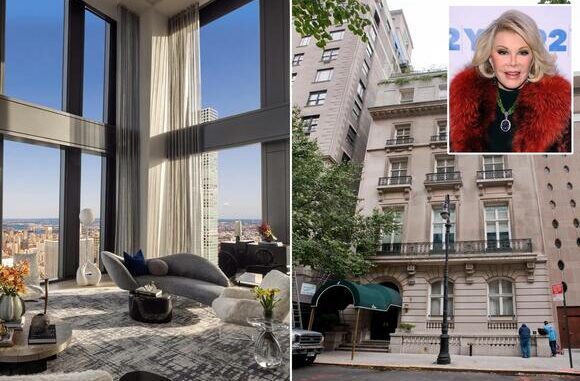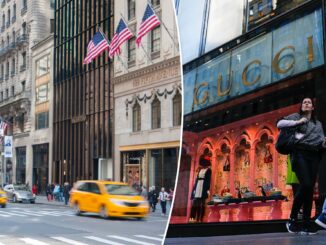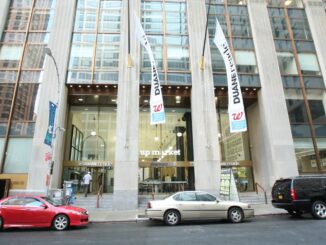
Sometimes, even the fanciest Manhattan apartments get no respect.
Just peek inside 1 E. 62nd St., an excellent Upper East Side building steps from Central Park.
The palatial penthouse — done up in a boldly Baroque polish as unblushing as Marie Antoinette — was the home of Joan Rivers.
The late comedienne maintained until her death in 2014 that her three-level, 11-room home was haunted by a malevolent spirit.
It hit the market in 2021, asking $38 million.
Since then it’s sat, unable to tempt a buyer for 919 days.
Compare that to the average amount of time it took to sell a “luxury” home (price tag: $5 million and up) in the fourth quarter of 2023: 108 days, according to Douglas Elliman.
A “normal” home — one below $5 million — in New York is snapped up in 79 days or less, on average.
But even after a price reduction to $34.5 million, Rivers’ manse didn’t move.
Her estate raised the white flag and took the home off the market last November, putting it into the twilight realm of real estate’s living dead.
Not only are these homes like zombies that refuse to die, but their owners defy the law of supply and demand.
It’s like they’re from another planet, experts say.
“It’s a fact that anything sitting for substantially longer than current marketing times has a pricing problem,” said real estate numbers man Jonathan Miller, president of appraisal firm Miller Samuel. “There is a significant disconnect from the market. [Sky-high prices] are damaging the value of the property, because [sellers are] projecting the message that they’re completely unrealistic.”
Broker Jennifer Lenz, who was working to sell Rivers’ home, argues that it can make sense for a seller to wait for a certain price if they have the ability (i.e.: plenty of cash).
“It’s a much better strategy than using price chops to chase potential buyers,” she told the Post.
But time is money and Rivers’ home has a carrying cost of $16,812 per month.
That means that waiting for the pie-in-the-sky price has already cost roughly $554,796—and the clock is still ticking.
“I guess if you don’t believe in the time value of money and if you want to sit and wait two or three years while you’re paying taxes, common charges, and construction cost … that’s a logic,” Miller said.
Look behind you, because there’s never only one zombie.
A dozen blocks uptown, the stately co-op at 927 Fifth Avenue is also infected with the voodoo hoodoo.
Its ninth floor — a 14-room mansion with 55 feet of Central Park frontage — has so many carats society diamond dealer Harry Winston made it his home.
But since 2018, it’s been dying a death by a thousand price cuts.
First listed for $39.5 million, it was reduced to $35.5 million, then $32.5 million and $32.25 million, $31.25 million, $29.95 million, $29.8 million, $28.75 million, $28.55 million, $27.95 million, $27.75 million, $27.5 million…and finally where it rests today: $27.4 million, after almost 1,500 days on the market.
Monthly maintenance here is $22,120, which means that the owner has spent about $1.1 million in carrying costs since listing the place.
“Although this extraordinary property has not sold yet, the listing has generated extraordinary interest and we have received multiple strong offers,” said Louise Beit of Sotheby’s International Realty in a statement to The Post. “I am confident that we will find the right buyer who will cherish this property,”
Brokers told The Post that there’s all kinds of dope bubbling under the surface that could keep a good apartment with a top address in a coma.
Vexing renovation rules and approval costs may make makeovers unappealing.
Construction next door could make buyers cautious.
High-interest rates can keep money from moving. Sometimes a building can even trip over its own shoelaces.
“Trying to get a co-op board to tell you what they are looking for is a challenge,” said broker Vickey Barron. “You run the buyer’s financials by the board president. They make $4 million a year and have $10 million in liquidity. But then the board says, ‘That isn’t enough.’ Well, how much liquidity does someone need for a $6 million apartment? Now, the buyer is insulted and everyone feels defeated.“
Even an ostensibly perfect poodle can kill a deal.
“The board won’t say that pets are not allowed, but when the applicant has a pet, suddenly they want to weigh the pet; they want blood samples,” Barron says. “All of a sudden you get a rejection and it’s because someone on the board didn’t want that particular pet.”
But broker Donna Oslan, president of Olshan Realty, says putting a listless listing out of its misery is simple: Just shoot it in the head.
“Lower the price,” said Olshan. “You can pick out a lot of things and say, ‘You know, this co-op needed a lot of work. It was frumpy. It’s in a bad location.’ But everything sells if the price is right.”
This simple cure to Manhattan’s zombie-home apocalypse isn’t restricted to the buildings from the Gilded Age. The city’s new guard of glass-coated Midtown supertalls isn’t safe either.
Next door to the Museum of Modern Art, 53W53 rises 1,050 feet with a daring geometric design by Pritzker Prize-winning architect Jean Nouvel.
Inside, 161 condominiums were laid out with moody-expressive interiors by Thierry Despont, best suited to those with a penchant for black cashmere turtlenecks.
It’s like living in a Rothko.
So why have 16 units failed to find an owner?
It’s been eight years since the building launched in 2016 and six years since Penthouse 76 hit the market in Sept. 2018.
It hasn’t budged on price in all of that time either, with an ask of $63.8 million, despite racking up more than $1.3 million in common charges.
Developers Pontiac Land Group and Hines declined to comment.
But Miller said that, in these types of situations, the developer is often constrained.
“Lenders lend based on a certain price structure and they have certain goals in mind,” said Miller of new developments generally. “The building could have been priced for a market that no longer exists today, but to lower prices they might need permission from the lender. Maybe it wasn’t even priced correctly to begin with.”
When worst comes to worst, developers may be forced to milk a unit for cash.
That’s what happened to the soaring 42nd-to-43rd-floor penthouse at the Foster + Partners-designed 50 United Nations Plaza.
After 1,320 days on the market and price cuts from $70 million to just $39.95 million, Zeckendorf Development let — horrors — a renter into its crown jewel.
The six-bedroom, 9,704-square-foot home, towering over the East River, was asking $75,000 per month.
Real Estate – Latest NYC, US & Celebrity News



